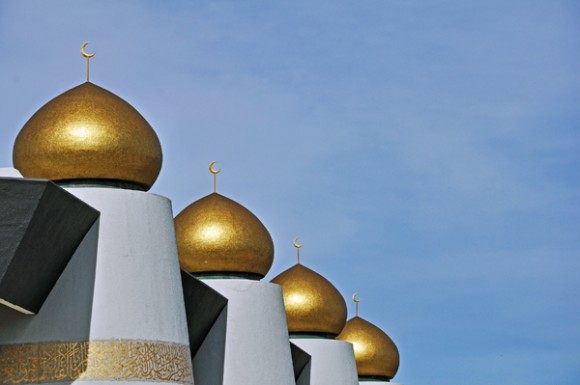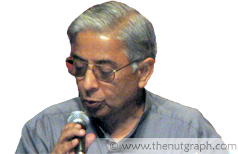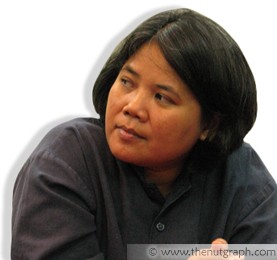ACCORDING to MCA president Datuk Seri Dr Chua Soi Lek, Malaysia has much to fear if the Pakatan Rakyat (PR) takes power federally. Chief among his many worries is PAS’s avowed agenda to establish an Islamic state and impose hudud. The Barisan Nasional (BN) has also run a series of advertisements demonising PAS over the hudud issue and imploring Malaysians to “vote wisely”.

The BN attacks on PAS’s hudud agenda involve scaremongering of the worst kind, pitting Malaysians of different faiths against each other and causing unnecessary fear and suspicion. It is particularly despicable since Umno-owned Utusan Malaysia is constantly warning Malay Malaysians that the DAP controls PAS, and that Chinese Malaysians will rule the country to their detriment if the PR takes power. Rather than hold PAS accountable to their hudud goals, which may risk angering Muslim Malaysians, the MCA instead chooses to demonise the DAP for associating with PAS.
The BN’s alarmist politics aside, can hudud law actually become a reality for Malaysians? And how likely is it that it will be implemented in the near future?
Legal issues
Hudud generally refers to a specific list of offences and punishments. The Kelantan and Terengganu hudud enactments, which are not yet in force, recognise six offences – theft, robbery, illicit sex, unproven accusations of illicit sex, alcohol consumption and apostasy. It also prescribes specific punishments such as amputation of the right hand for theft, and 100 cane strokes and one year’s imprisonment for illicit sex.
The constitution currently grants states the power to enact offences against the precepts of Islam but only over persons professing Islam.[1]

“To implement hudud on non-Muslims, there needs to be a constitutional amendment requiring a two-thirds majority in Parliament,” constitutional expert Emeritus Professor Datuk Dr Shad Saleem Faruqi tells The Nut Graph in a phone interview. “It may also require the consent of the Conference of Rulers under Article 159(5) of the Constitution.”
It is also arguably unconstitutional for hudud in its entirety to be implemented on Muslims. Federally, Parliament cannot enact Islamic criminal laws as that is under state jurisdiction. But, at the state level, states do not have carte blanche to do as they please. They can only enact matters as contained under the State List, and which do not conflict with federal law. Crimes such as theft and rape, contained in the federal Penal Code, thus cannot be enacted by the state.
Also, the punishments meted out under state syariah law cannot exceed what has been set out under federal law. This is governed by the Syariah Offences (Criminal Jurisdiction) Act 1965, which prescribes a maximum sentence of six strokes, RM5,000 fine and/or three years’ jail.
Already crimes
Having said that, crimes such as apostasy, illicit sex and alcohol consumption are not federal crimes and are already illegal in many states, including those under the BN. Thus, some of the acts which hudud law would criminalise are already crimes, although the punishment is limited by the 1965 Act.
The Pahang Syariah Court, for example, sentenced Kartika Sari Dewi Shukarno in 2009 to six cane strokes and a fine of RM5,000 for drinking beer, although the caning was later commuted. In 2010, three women were imprisoned for at least a month and caned up to four to six times in Kajang Prison for illicit sex.

Shad Saleem confirms that the maximum sentences currently set by the 1965 Act can be increased by a simple majority of those present and voting in Parliament. If, for instance, Parliament were to increase the maximum sentence to 100 cane strokes, and state enactments followed suit, a person could theoretically be found guilty of illicit sex and sentenced to 100 strokes, as stipulated in the hudud enactments respectively passed by the PAS-led Kelantan and Terengganu governments in 1993 and 2002.
Shad Saleem states that punishments under the Penal Code can also be amended with a simple majority. However, it cannot be stated that hudud or Islamic law is being implemented, as that would be unconstitutional.
Will PAS do it?
As the numbers stand, PAS by itself cannot make hudud a reality even if the PR comes into power following the 13th general election that will be held on 5 May 2013. PAS is contesting 73 out of 222 seats, far from even a simple majority. PAS would require the assistance of their PR counterparts, or, even possibly, an Umno opposition eager to prove their Islamic credentials.
Political scientist Wong Chin Huat is of the view that hudud would not be a top priority for a newly formed PR federal government. “This is not so much a theological issue as a political one,” he says in a phone interview.
Wong says what drives the hudud agenda is ethnic politics and the necessity to differentiate one’s party from the others. For so long as PAS does not have power federally, its hudud agenda is a means of “product differentiation” in the game to outdo Umno. But once in power, the need to run the country and the resources available at one’s disposal provide greater incentives to be moderate.
“Other priorities will arise, such as the need to maintain the economy, and not drive away tourists and investors,” says Wong.
Wong, however, states that in the event that the PR takes power, a “desperate”, unelectable Umno may keep the hudud agenda alive by taking up the Islamist mantle as it would no longer have an incentive to appear moderate. This would lend support to the conservatives within PAS and continue to fuel the hudud debate and the bid to out-Islamise one another, which has been ongoing for decades between PAS and Umno.
Wong says reintroducing local elections would help stave off this likelihood. Why? Because Umno would then have some possibility of taking power locally, and would again have the incentive to appear moderate and appeal to a wider section of society.
Mindset

Ultimately, however, whether or not hudud becomes a reality in Malaysia will depend very much on what Malaysians want. Muslim women activist and filmmaker Norhayati Kaprawi recalls a Merdeka Centre survey which found that about 70% of Malaysian Muslims supported Kartika’s caning sentence.
“People think because it is part of hudud, caning is Islamic. But they forget what justice is all about,” Norhayati says in a phone interview. “Why should only this woman be caned when it’s a known fact that many Muslims drink? Why was Kartika singled out?” she asks.
Norhayati points out that Kartika was a first-time offender, and was not drunk or causing trouble. Yet she was given the maximum fine and a caning sentence as if she had committed the biggest syariah offence. “This very punitive mindset is what worries me. From media comments, the mentality seems to be that the purpose of hudud is to impose the harshest punishment,” Norhayati says.
She points out that this mindset didn’t just come about because of PAS. It’s the result of what has been an inexorable process of Islamisation in Malaysia for which Umno, PAS, and Islamic state and non-state actors have been responsible.
Norhayati also disagrees with the reassurance that hudud would not affect non-Muslims. “This sort of call is irresponsible. It is polarising – asking one segment of society not to bother with the other.” Furthermore, she says it is inaccurate to say hudud will not impact non-Muslims. “Based on PAS’s current hudud enactments in Kelantan and Terengganu, only Muslim males are eligible to be court witnesses. The testimonies of non-Muslims (and also Muslim women) are not accepted in PAS’s hudud-style Islamic courts. How can that court operate in a multi-religious society like Malaysia? What if a non-Muslim is robbed by a Muslim?”
Ultimately, whether or not hudud becomes part of Malaysian law will depend very much on its people. Politicians, after all, are sensitive to the electorate’s demands. If there is serious disagreement among Malaysian citizens over hudud, we need to be able to talk about it openly, knowledgeably and reasonably.
The BN’s advertisements and campaign in this election have clearly made that difficult to happen. Indeed, neither the BN nor the PR have been discussing the hudud issue objectively, choosing instead to politicise it for partisan gain. Can the PR do a better job of opening up a truly democratic space for hudud to be discussed intelligently and rationally? That’s left to be seen. But it may just be the time to give them the chance to try. ![]()
[1] Federal Constitution, Ninth Schedule, State List, Para 1
[related-posts]


GlueBall says
We’ve already experienced gender segregation affecting non-Muslims at salons at Kota Bharu. PAS and hudud laws would further subject non-Muslims everywhere to this retrograde ideology which is incompatible with modern civil society. Malaysia would not achieve developed-nation status under Islamization. To be sure, foreign investors and tourists would shy away from such a restrictive lifestyle.
Mrs T says
If you look at the current state that Malaysia, with its endemic corruption, discrimination, level of crime and breakneck regression into the stone-age, HUDUD is probably the way to go. We have nothing else to lose anyway.
My family and I and everyone I know are peace-loving people, we do not commit crimes, so we are not worried about getting our hands chopped off. Probably the politicians from BN are the ones who would get their hands chopped off.
I don’t care about different queues in the supermarket. I’m there to shop, not to socialise.
I don’t want my children and their children to continue living their lives under BN rule.
mo halim says
HUDUD.
The Quran mentions hudud fourteen [14] times at: 2:187 [x 1], 2:229 [x 4], 2:230 [x 2], 4:13 [x 1], 4:14 [x 1], 9:97 [x 1], 9:112 [x 1], 58:4 [x 1], 65:1 [x 2]. None of them have anything to do with stoning apostates to death or chopping off bits of human anatomy. They are about domestic issues between husbands and wives.
But where is PAS’ definition of hudud? If their hudud is exactly the same as the ones described in the Quran, and it should be, why have they not published it? Or just quote which surah / ayat mention hudud and we can look it up ourselves? And if it is different from the hudud in the Quran, can the Tok Guru and PAS please explain why? I am sure they are aware of these warnings from the Quran:
“Among them are those who twist their tongues to imitate the scripture that you may think it is from the scripture, when it is not from the scripture, and they claim it is from GOD, when it is not from GOD. Thus, they utter lies and attribute them to GOD, knowingly” [3:78].
“You shall not utter lies with your own tongues stating “This is lawful, and this is unlawful” to fabricate lies and attribute them to GOD. Surely, those who fabricate lies and attribute them to GOD will never succeed” [16:116].
Adam says
Mo Halim,
I have been waiting and waiting for some Islamic scholar to respond or clarify your above statements on hudud in the Quran. Seems no one is interested to give any opinion or just cannot refute what you have said and quoted.
If hudud were indeed about domestic issues between husbands and wives like you have said, then the present syariah family laws should be considered as hudud already, right? No?
Flag of Truth says
@ MO Halim & Adam.
I have the obligation to explain further because I found out that all this while there are some misunderstandings about hudud.
Hudud in Arabic means ‘limits or restriction’ but in Islam, hudud means law. It does not just cover domestic problems in a marriage but it covers everything. Whatever rules and regulations that are mentioned in the Quran (whether it’s mentioned hudud or not), it is a law.
The Quran was revealed by phases. That means we will find that the verses in the Quran are meant to explain some situation that happened during the life of Muhammad (pbuh) or problems concerning Muslims.
So if you read the Quran, you always have to refer to the meaning and also the ‘tafsir’ which explains why certain verses were revealed to Muhammad (pbuh).
So if you guys want to know more about hudud, I suggest you read. Not just conclude something that is totally not right.
And yes, the punishment for apostates is death, unless they repent. This is directly from Allah. We can find it in Surah At Taubah (9:5). I know that to certain individuals this is considered a cruel punishment and does not go along with international human right’s law.
But we must understand the wisdom in God’s word. In the Quran (Surah Al Baqarah 2:216), Allah explains only He knows what is best for men. “Fighting has been enjoined upon you while it is hateful to you. But perhaps you hate a thing and it is good for you; and perhaps you love a thing and it is bad for you. And Allah Knows, while you know not”.
I would prefer following the words from Allah.
Adam says
Flag of Truth,
You have quoted Surah At Taubah (9.5) to justify punishment of death for apostates and I have referred to the Pickhall version as follows: “Then, when the sacred months have passed, slay the idolaters wherever ye find them, and take them (captive), and besiege them, and prepare for them each ambush. But if they repent and establish worship and pay the poor-due, then leave their way free. Lo! Allah is Forgiving, Merciful.”
This chapter was revealed at a time of war. If you actually use it to justify killing of apostates, no wonder Muslims like you would always be in a state of war. Idolaters would also mean unbelievers and pagans as in other versions and if you really hang on to this verse, you are actually also justifying killing all of the Non-Muslims and non-conforming Muslims as well. Then, how do you insist that we leave Muslim matters to Muslims?
Perhaps, you should quote Surah An Nisa 4.89 for better justification. But then, there are so many contradictory interpretations of such verses by prominent Islamic scholars that there is obviously no consensus on the matter. It is always sensical to follow the advice by Benjamin Fraklin that “when in doubt, don’t”.
Flag of Truth says
@ Adam.
Thanks for sharing :). Yes I agree that Surah An Nisa: 4:89 explains about apostates.
After the death of Prophet Muhammad, there were lots of Muslims who turned away from practising Islam (becoming apostates, not performing their prayers and paying zakat). The first Caliph (Abu Bakr) made it his priority to make war against all the apostates and those who did not want to pay their zakat. This is a justified war, hence why I quoted surah At-Taubah.
As I have mentioned before (in my previous posted comment), we must also look at the hadith and in this case, by Sahih Albukhari (volume 9:book 83: number 17) to have a better understanding of this issue:
Narrated Abdullah:
Allah’s Apostle said, “The blood of a Muslim who confesses that none has the right to be worshiped but
Allah and that I am His Apostle, cannot be shed except in three cases: In Qisas for murder, a married
person who commits illegal sexual intercourse, and the one who reverts from Islam (apostate) and leaves
the Muslims.
With regards to what you previously claimed (regarding the rights of non-Muslims), actually it is guaranteed by Allah. As long as we understand each other, and we respect our own beliefs. this is mentioned in Surah Al kafirun (109:1-5):
1. Say: “O disbelievers!” 2. “I worship not that which you worship.” 3. “Nor will you worship whom I worship.” 4. “And I shall not worship that which you are worshiping.” 5. “Nor will you worship that which I worship.” 6. “To you be your religion, and to me my religion.”
Allah knows best. 🙂
wizenkl says
Flag of Truth ,
Another similar hadith to Sahih AlBukhari (volume 9:book 83: number 17) is Sunan Abu Dawud (Vol. 4, Number 4353) :
The blood of a Muslim, who confesses that none has the right to be worshiped but God and that I am His Apostle, cannot be shed except in three cases: (1) a married person who commits adultery; he is to be stoned and (2) a man who went out fighting against God and His Messenger; he is to be killed or crucified or exiled from the land and (3) a man who murders another person; he is to be killed on account of it.
#2 of the said hadith is similar to Quran5:33 (Sahih International) :
Indeed, the penalty for those who wage war against Allah and His Messenger and strive upon earth [to cause] corruption is none but that they be killed or crucified or that their hands and feet be cut off from opposite sides or that they be exiled from the land. That is for them a disgrace in this world; and for them in the Hereafter is a great punishment
We have 2 kinds of apostates
(1) a peaceful apostate
(2) an apostate who wages war against muslims
Another interesting hadith , Sahih Bukhari vol9 bk89 no316 :
Narrated Jabir bin ‘Abdullah:
A bedouin gave the Pledge of allegiance to Allah’s Apostle for Islam and the bedouin got a fever where upon he said to the Prophet “Cancel my Pledge.” But the Prophet refused. He came to him (again) saying, “Cancel my Pledge.’ But the Prophet refused. Then (the bedouin) left (Medina). Allah’s Apostle said: “Medina is like a pair of bellows (furnace): It expels its impurities and brightens and clears its good.”
Food for thought ….